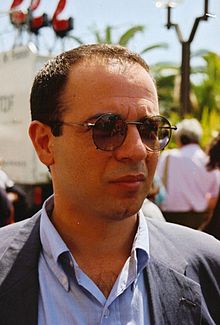Italian film director and screenwriter
.mw-parser-output .hidden-begin{box-sizing:border-box;width:100%;padding:5px;border:none;font-size:95%}.mw-parser-output .hidden-title{font-weight:bold;line-height:1.6;text-align:left}.mw-parser-output .hidden-content{text-align:left}You can help expand this article with text translated from
the corresponding article in Italian. (February 2022) Click [show] for important translation instructions.
Machine translation, like
DeepL or
Google Translate, is a useful starting point for translations, but translators must revise errors as necessary and confirm that the translation is accurate, rather than simply copy-pasting machine-translated text into the English Wikipedia.
Consider
adding a topic to this template: there are already 3,006 articles in the
main category, and specifying|topic= will aid in categorization.
Do not translate text that appears unreliable or low-quality. If possible, verify the text with references provided in the foreign-language article.
You must provide
copyright attribution in the
edit summary accompanying your translation by providing an
interlanguage link to the source of your translation. A model attribution edit summary is Content in this edit is translated from the existing Italian Wikipedia article at [[:it:Giuseppe Tornatore]]; see its history for attribution.
You should also add the template ((Translated|it|Giuseppe Tornatore)) to the
talk page.
For more guidance, see
Wikipedia:Translation.
Giuseppe Tornatore |
|---|
 |
| Born | (1956-05-27) 27 May 1956 (age 67)
|
|---|
| Occupation(s) | Film director, screenwriter |
|---|
| Years active | 1985–present |
|---|
| Awards | Academy Award |
|---|
Giuseppe Tornatore (born 27 May 1956) is an Italian film director and screenwriter. He is considered one of the directors who brought critical acclaim back to Italian cinema.[1] In a career spanning over 30 years he is best known for directing and writing drama films such as Everybody's Fine, The Legend of 1900, Malèna, Baarìa and The Best Offer. His most noted film is Cinema Paradiso, for which Tornatore won the Academy Award for Best Foreign Language Film. He has also directed several advertising campaigns for Dolce & Gabbana.[2]
Tornatore is also known for his long-standing association with composer Ennio Morricone, who composed music for thirteen Tornatore feature films since 1988.[3][4]
Life and career
Born in Bagheria, near Palermo, Tornatore developed an interest in acting and the theatre from at least the age of 16 and put on works by Luigi Pirandello and Eduardo De Filippo.
He worked initially as a freelance photographer. Then, switching to cinema, he made his debut with Le minoranze etniche in Sicilia (The Ethnic Minorities in Sicily), a collaborative documentary film which won a Salerno Festival prize. He then worked for RAI before releasing his first full-length film, Il Camorrista, in 1985. This evoked a positive response from audiences and critics alike and Tornatore was awarded the Silver Ribbon for best new director.
In 1988, a collaboration with producer Franco Cristaldi gave birth to Tornatore's best known screen work: Cinema Paradiso, a film narrating the life of a successful film director who has returned to his native town in Sicily for the funeral of his mentor. This obtained worldwide success and won an Academy Award for Best Foreign Language Film.[5] Subsequently, Tornatore released several other films. In 2007 he won the Silver George for Best Director at the 29th Moscow International Film Festival for The Unknown Woman.[6]
Personal life
Tornatore describes himself as "one who does not believe and who regrets this".[7] His brother, Francesco Tornatore, is a producer.

